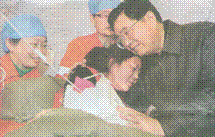
��Ŀ�� ��Դ�� �}�ͣ�
| A��where | B��which | C��who | D��when |
�鿴�𰸺ͽ���>>
��Ŀ�� ��Դ�� �}�ͣ�

�鿴�𰸺ͽ���>>
��Ŀ�� ��Դ�� �}�ͣ���x����
| ���}1�� |
|
| ���}2�� |
|
| ���}3�� |
|
| ���}4�� |
|
| ���}5�� |
|
| ���}6�� |
|
| ���}7�� |
|
| ���}8�� |
|
| ���}9�� |
|
| ���}10�� |
|
�鿴�𰸺ͽ���>>
��Ŀ�� ��Դ�� �}�ͣ�
| A��jacket | B��coat | C��sweater | D��shirt |
| A��got to the office | B��got home | C��went to work | D��went to the shop |
| A��rain | B��snow | C��cloud | D��shine |
| A��take away | B��take off | C��put up | D��put on |
| A��a(ch��n) good sweater | B��a(ch��n)n expensive sweater |
| C��a(ch��n) comfortable sweater | D��a(ch��n) cheap but not good sweater |
�鿴�𰸺ͽ���>>
��Ŀ�� ��Դ�� �}�ͣ���x����
 | President Hu Jintao flew to the earthquake-hit region in Yushu, Qinghai on April 18, 2010. At a field hospital on the grounds of a sports stadium, Hu sat on the bed of Drolma, a middle school student, and held her in his arm as she wept(����). ��Rest assured(���ĵ�), you will have a full recovery(����(f��)). Be strong. You will have a bright future,�� he told her. |
 The 2010 World Expo, Shanghai China | The 2010 World Expo Shanghai China Duration(�e�k�r(sh��)�g): May 1 to October 31, 2010 Expected visitors: 70 million Theme(���}) : ��Better City, Better Life.�� The theme represents the common wish of the people all over the world for a better living in future urban(���е�) environments. |
 | The 19th FIFA World Cup(���籭����ِ) Duration: June 11 to July 12, 2010 Host(���k) nation: South Africa Number of teams: Thirty-two Number of matches: Sixty-four It is the first time that the tournament(�\��(bi��o)ِ) has been hosted by a nation in the Confederation((li��n)��) of African Football. |
| A��on May 1 | B��on June 11 | C��on April 18 | D��on July 12 |
| A��a(ch��n) middle school student | B��a(ch��n) soldier |
| C��a(ch��n) farmer of Yushu | D��a(ch��n) doctor |
| A��September 30 | B��October 31 | C��November 30 | D��December 31 |
| A��Better City, Bright future. | B��Better City, Good Environment. |
| C��Better City, Better Life. | D��Better City, Best Investment(Ͷ�Y). |
| A��10 | B��12 | C��13 | D��32 |
�鿴�𰸺ͽ���>>
��Ŀ�� ��Դ�� �}�ͣ���x����
|
�鿴�𰸺ͽ���>>
��Ŀ�� ��Դ�� �}�ͣ���x����
| A��a(ch��n)re remembered by everyone |
| B��express all that we think in our mind |
| C��include few senses and things we touch |
| D��a(ch��n)re sometimes nightmares that repeat and frighten us |
| A��Sigmund Freud | B��Robert Stickgold | C��Carl Jung | D��the writer |
| A��believe dreams can help people understand all the problems that they face |
| B��think dreams always hide someone��s feelings about sex or aggression |
| C��study dream and dreaming and have their own ideas |
| D��have the same idea that people often dream about the things they want |
| A��Jung thought that dreams provide solutions to problems we face when we are sleeping |
| B��Freud developed the idea that dreams are expressions of people��s hidden feelings |
| C��scientists have known quite well why we dream because they can take pictures of our brains |
| D��other researchers have discovered how dreaming helps our bodies work with problems and very sad emotions |
| A��The Explanations of Dreams | B��The Ways of Dreams |
| C��The Solutions to Dreams | D��The Mystery(�W��) of Dreams and Dreaming |
�鿴�𰸺ͽ���>>
��Ŀ�� ��Դ�� �}�ͣ�
| is fly help whose house |
�鿴�𰸺ͽ���>>
��Ŀ�� ��Դ�� �}�ͣ�
�鿴�𰸺ͽ���>>
��Ŀ�� ��Դ�� �}�ͣ�
�鿴�𰸺ͽ���>>
�ٶ����� - ����(x��)���б� - ԇ�}�б�
����ʡ��(li��n)�W(w��ng)�`���Ͳ�����Ϣ�e��(b��o)ƽ�_ | �W(w��ng)���к���Ϣ�e��(b��o)���^(q��) | ����p�_�e��(b��o)���^(q��) | ��vʷ̓�o���x�к���Ϣ�e��(b��o)���^(q��) | �����֙�(qu��n)�e��(b��o)���^(q��)
�`���Ͳ�����Ϣ�e��(b��o)�Ԓ��027-86699610 �e��(b��o)�]�䣺58377363@163.com